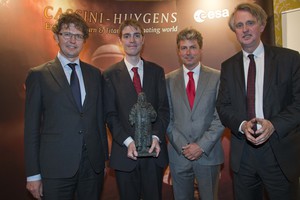 |
|
Fig. 1:
From left: secretary of education Sander Dekker, laureate Diederik
Kruijssen, Professor Jacco Hoekstra (TU Delft), chairman of the Christiaan
Huygensprijs foundation Dick Benschop.
Copyright: ESA/A. le Floc'h
|
 |
|  |
In his award-winning PhD thesis, Kruijssen studied the "Formation and evolution
of star clusters and their host galaxies" using star clusters as fossils that
tell the story of the formation histories of their host galaxies. The thesis
consists of two parts: the formation of stars and stellar clusters and their
evolution, and the modelling of isolated and colliding galaxies including their
star clusters.
Previously, astronomers thought that all stars are born in clusters with about
90% of them dissolving immediately so that presently only a small fraction of
all stars reside in clusters. Detailed computer simulations, however, showed
that the processes leading to such dissolution do not work as expected. This
means that only a small fraction of all stars is actually born in
gravitationally bound star clusters. In the long run, the stellar clusters
dissolve due to the tidal forces of their host galaxy as well as the
gravitational perturbations caused by passing gas clouds. Kruijssen derived a
new physical model, which is computationally more efficient than previous large
computer simulations but can still predict accurately which stars escape from a
dissolving star cluster. In this way, the properties of a cluster (such as its
colour and brightness) can be easily predicted for any phase of its evolution.
Large computer simulations of isolated and colliding galaxies could then
capture the influence of the galaxies on the formation and dissolution of star
clusters in its entirety by accurately calculating the tidal effects on each
cluster. The results showed that the pace of cluster dissolution varies
substantially in space and time - sometimes even giving the false impression
that the galactic environment plays no role at all. Surprisingly, collisions
between galaxies led to a decrease of the number of star clusters in the
simulations, whereas observations of colliding galaxies show that many clusters
are being born in such environments. However, the destruction of clusters turns
out to dominate because of the quickly changing gravitational forces, which
cause the newly formed clusters to be rapidly destroyed.
The thesis thus showed that the formation and evolution of star clusters are
not as simple as previously thought. In addition, it provides a physical
framework to interpret the properties of star cluster populations and in
particular the old globular clusters that were formed in young galaxies shortly
after the Big Bang.
The Christiaan Huygens Prize is awarded each year by the Dutch Royal Academy of
Sciences to a researcher who has made an innovative contribution to science
with his or her PhD thesis. In addition to the certificate, the awardee
receives a monetary sum of €10,000 and a bronze statue of Huygens. Each
year, the prize is awarded in one of the five disciplines in which Christiaan
Huygens (1629-1695) was active: actuarial sciences and econometrics,
theoretical and applied physics, astronomy and space sciences, information and
communication technology, and economical sciences.
For more information:
 Christiaan Huygens Prize Christiaan Huygens Prize
Contact:
Dr. Hannelore Hämmerle
Press Officer
Max Planck Institute for Astrophysics, Garching
Tel. +49 89 30000-3980
E-mail: pr mpa-garching.mpg.de mpa-garching.mpg.de
|